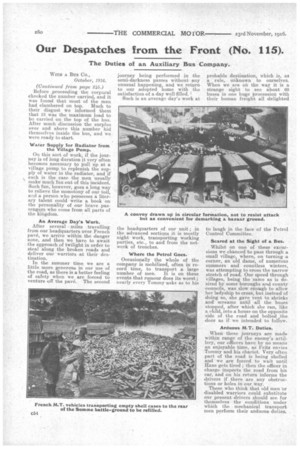Our Despatches from the Front (No. 115).
Page 18

If you've noticed an error in this article please click here to report it so we can fix it.
The Duties of an Auxiliary Bus Company.
WITH A Bus CO., October, 1916.
(Continued from page 245.) Before _proceeding the corporal checked the number carried, and it was found that most of the men had clambered on top. Much to their disgust we informed them that 13 was the maximum load to he carried on the top of the bus. After much discussion the surplus over and above this number hid themselves inside the bus, and we were ready to start.
Water Supply for Radiator from the Village Pump.
On this sort of work, if the journey is of long duration it very often
becomes necessary to pull up at a•village pump to replenish the sup
ply of water in the radiator, and if such is the case the men usually make muchfun out of this incident. Such fun, however, goes a long way to relieve the monotony of our toil, and a person who possesses a literary talent could write a book on the personality of our brave passengers who come from all parts of the kingdom.
An Average Day's Work.
After several miles travelling from our headquarters over French pave, we arrive within the danger zone, and then we have to await the approach of twilight in order to steal along the broken roads and deliver our warriors at their destination.
In the summer time we are a little more generous in our use of the road, as there is a better feeling of safety when we are forced to venture off the pave. The second
journey being performed in the semi-darkness passes without any unusual happening, and we return to our adopted home with the satisfaction of a day well filled. I Such is an average day's work at
the headquarters of our unit; in the advanced sections it is mostly night work, transporting working parties, etc., to and from the network of trenches.
Where the Petrol Goes.
Occasionally the whole of the company is mobilized, often in record time, to transport a large number of men. It is on these events that rumour does its worst ; nearly every Tommy %asks as to his probable destination, which is, as a rule, unknown to ourselves. When we are on the way it is a strange sight to see about 60 buses in one huge procession with their human freight all delighted to laugh in the face of the Petrol Control Committee.
Seared at the Sight of a Bus.
Whilst on one of these excursions we chanced to pass through a small village, where, on turning a corner, an old dame, of numerous summers and countless winters, was attempting to cross the narrow stretch of road. Our speed through -villages, being the same as is desired by some boroughs and county councils, was slow enough to allow her ladyship to cross, but instead of doing so, she gave vent to shrieks and screams until all the buses stopped, after which she ran, like a child, into a house on the opposite side of the road and bolted the door as if we intended to follow.
Arduous M.T. Duties.
When these journeys are made within range of the enemy's artillery, our officers have by no means an enjoyable time, as Fritz envies Tommy and his chariot. Very often part of the road is being shelled and we are forced to wait until Hans gets tired ; then the officer in charge inspects the road from his car, and on his return informs the drivers if there are any obstructions or holes in our way.
Those who think that old men or disabled warriors could substitute our present drivers should see for themselves the conditions under which the mechanical transport men perform their arduous. duties.
























